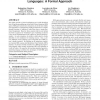Free Online Productivity Tools
i2Speak
i2Symbol
i2OCR
iTex2Img
iWeb2Print
iWeb2Shot
i2Type
iPdf2Split
iPdf2Merge
i2Bopomofo
i2Arabic
i2Style
i2Image
i2PDF
iLatex2Rtf
Sci2ools
111
click to vote
ATAL
2006
Springer
2006
Springer
Hierarchical planning in BDI agent programming languages: a formal approach
This paper provides a general mechanism and a solid theoretical basis for performing planning within Belief-Desire-Intention (BDI) agents. BDI agent systems have emerged as one of the most widely used approaches to implementing intelligent behaviour in complex dynamic domains, in addition to which they have a strong theoretical background. However, these systems either do not include any built-in capacity for "lookahead" type of planning or they do it only at the implementation level without any precise defined semantics. In some situations, the ability to plan ahead is clearly desirable or even mandatory for ensuring success. Also, a precise definition of how planning can be integrated into a BDI system is highly desirable. By building on the underlying similarities between BDI systems and Hierarchical Task Network (HTN) planners, we present a formal semantics for a BDI agent programming language which cleanly incorporates HTN-style planning as a built-in feature. We argue ...
Related Content
| Added | 20 Aug 2010 |
| Updated | 20 Aug 2010 |
| Type | Conference |
| Year | 2006 |
| Where | ATAL |
| Authors | Sebastian Sardiña, Lavindra de Silva, Lin Padgham |
Comments (0)

